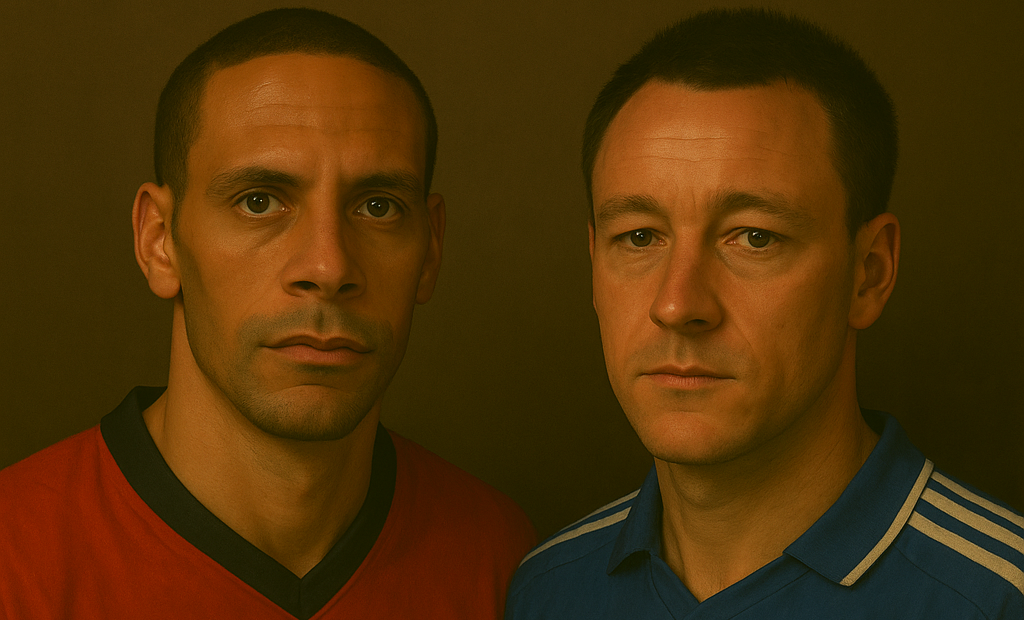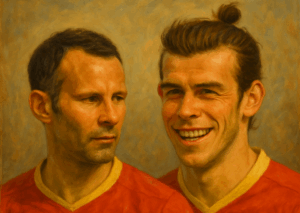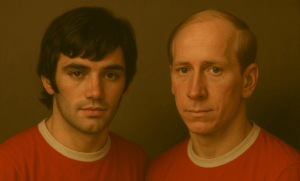
The GOAT of the 21st Century EPL and England Defense?
In the early 21st century, the English Premier League, the center of world football, was a stage for numerous star players. Among them, the presence of two center-backs who anchored the English national team’s defense and symbolized the era’s greatest rival clubs, Manchester United and Chelsea, was unparalleled: Rio Ferdinand and John Terry. If Ferdinand presented a new paradigm for the modern defender with his elegance and intelligence, Terry maximized the value of a traditional defender with his indomitable fighting spirit and overwhelming leadership.
Their rivalry was a driving force that made the golden era of the Premier League even more heated. Now, in 2025, with their playing careers concluded and new paths taken, we will look back on their footprints to conduct an in-depth analysis of the long-standing debate over who was truly the best defender of the 21st century.
1. A Comparative Analysis of Playing Styles: The Artist vs. The Warrior
Rio Ferdinand: The Perfection of the ‘Ball-Playing Defender’
Ferdinand is regarded as the player who perfected the concept of the ‘ball-playing defender.’ His play went beyond simply stopping opposition attacks; he also served as the starting point for his team’s offense.
- Technical Elegance and Build-up Play: He led his team’s build-up with smooth ball control reminiscent of a midfielder and precise passing ability.
- Defense Based on Intelligence and Anticipation: With an excellent view of the game, he showcased intelligent defending by anticipating and intercepting the opponent’s attack routes in advance.
- Overwhelming Physical Ability: Despite his tall frame of 189cm, he boasted surprisingly fast speed, which he used to perfectly cover the vast defensive space behind him.
John Terry: The Epitome of the ‘Warrior Defender’
John Terry was a player who possessed all the virtues a traditional English center-back should have. His play shone not with technical flair, but with a fighting spirit dedicated to the team and powerful leadership.
- Leadership and Fighting Spirit: His greatest weapon was his leadership that encompassed the entire pitch and a fighting spirit that didn’t spare his body. He was brave enough to literally block opponents’ shots with his head.
- Aerial Dominance and Set-Piece Threat: Based on outstanding jumping ability and positioning, he completely dominated aerial duels and was a potent weapon in attacking set-piece situations as well.
- Solid Defensive Organization: He excelled at building an iron-clad defensive line through organic chemistry with his defensive partners.
Partnerships: ‘Silk and Steel’ with Vidić vs. The ‘Iron Wall’ with Carvalho
Ferdinand formed a perfect combination with Nemanja Vidić, known as ‘Silk and Steel.’ Ferdinand’s elegant and intelligent play (Silk) and Vidić’s aggressive and tough defending (Steel) complemented each other perfectly. John Terry built Chelsea’s ‘iron wall’ defense with Ricardo Carvalho, and their record of conceding only 15 goals in the 2004-05 Premier League-winning season proves just how solid their partnership was.
2. A Comparison of Career Records and Honors
Total Club Career Statistics
| Player | Total Appearances | Total Goals | Total Assists |
|---|---|---|---|
| Rio Ferdinand | 701 | 13 | 11 |
| John Terry | 761 | 68 | 28 |
Major Trophies
| Competition | Rio Ferdinand | John Terry |
|---|---|---|
| Premier League | 6 | 5 |
| FA Cup | – | 5 |
| League Cup | 3 | 3 |
| UEFA Champions League | 1 | 1 |
| UEFA Europa League | – | 1 |
| Total | 11 | 15 |
Major Individual Awards
| Award | Rio Ferdinand | John Terry |
|---|---|---|
| PFA Team of the Year | 6 times | 4 times |
| FIFPRO World XI | 2 times | 5 times |
| PFA Players’ Player of the Year | – | 1 (2004-05) |
| UEFA Club Defender of the Year | – | 3 (2005, 2008, 2009) |
3. Leadership and Influence: Different Shades of Charisma
Rio Ferdinand: The Calm and Intelligent Leader
Ferdinand had a quiet and calm personality, but on the pitch, he was a leader who orchestrated the team with his intelligent play. He often played the role of calming his partner Vidić down when he got heated, and he commanded the entire defensive line based on his excellent understanding of the game.
John Terry: ‘Captain, Leader, Legend’
John Terry’s leadership can be summed up in one word: ‘charisma.’ He motivated his teammates by roaring on the pitch and boosted team morale with his body-on-the-line plays. He was a strong anchor who held the team together in moments of crisis.
4. Life Beyond the Pitch, as of 2025
Rio Ferdinand: The Successful Pundit and Businessman
Rio Ferdinand has transformed into one of the most successful pundits after his retirement. He has been a lead football analyst for TNT Sports for over a decade, offering sharp analysis, and is active in various fields, including successfully running the YouTube channel ‘Rio Ferdinand Presents FIVE,’ which has 1.32 million subscribers.
John Terry: The Chelsea Legend on a Coaching Path
John Terry is walking the path of a coach after his retirement. After gaining experience as an assistant coach at Aston Villa and Leicester City, he returned to his beloved Chelsea in 2023 to work as an academy coach. He is steadily preparing, having revealed his dream that his ultimate goal is to become the manager of the Chelsea first team.
Conclusion: Two Great Legacies That Cannot Be Separated
It is difficult to definitively state who was the absolutely better player between Rio Ferdinand and John Terry. They were two giants of different styles who reached the ‘top’ in their own ways.
The Case for Ferdinand: The Ideal Modern Defender
He presented the ideal model of a ‘ball-playing defender’ that modern football demands, based on his elegant ball control, intelligent game management, and overwhelming speed. His play expanded the concept of defending and gave new inspiration to many center-backs of later generations.
The Case for Terry: The Incarnation of Traditional Leadership
He showed all the virtues a traditional center-back could have, with his powerful leadership, indomitable fighting spirit, and unparalleled dedication. As the team’s spiritual anchor, he saved the team in moments of crisis, and his presence had a value that cannot be expressed in numbers.
Ultimately, the judgment of who was greater is bound to vary depending on an individual’s football philosophy and perspective. What is clear is that the fierce rivalry between these two players made the Premier League of the early 21st century the most exciting stage, and the great legacy they left behind will remain in the memory of football fans for a long time to come.




